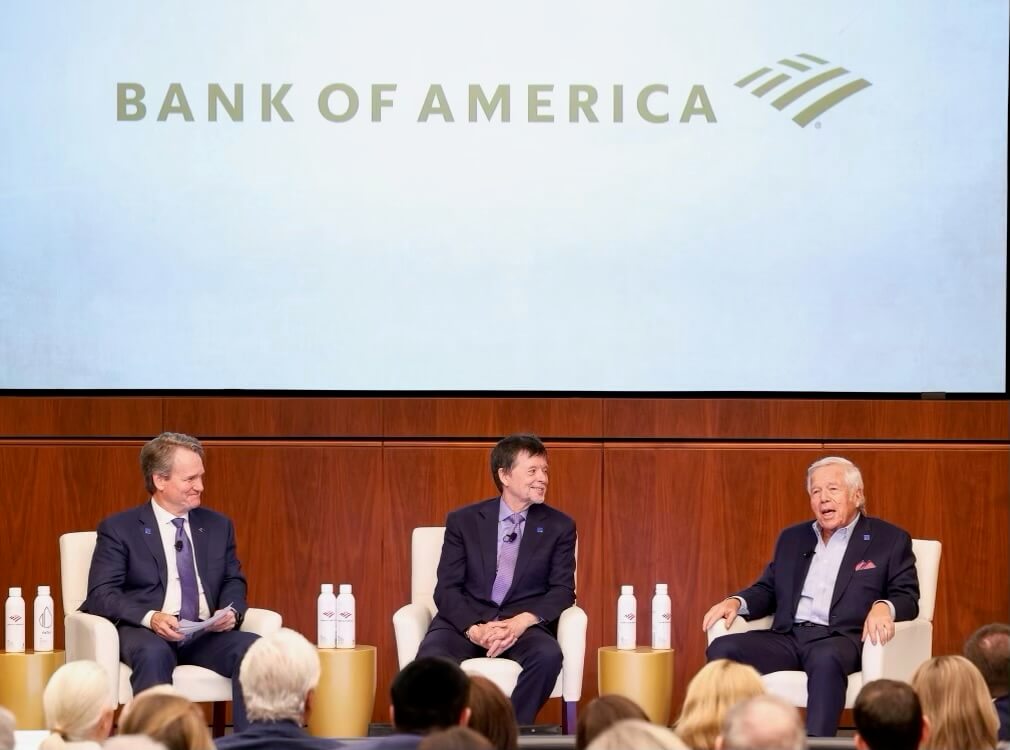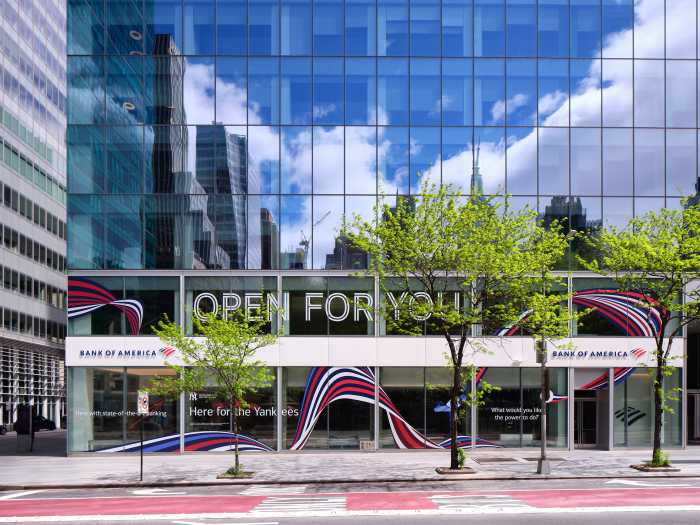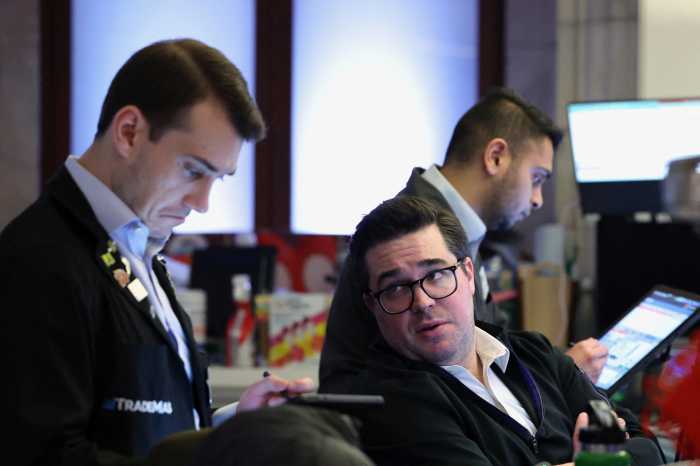Bank of America will be donating $10 million to the Foundation to Combat Antisemitism (FCAS) in the fight against hate crimes and violence against the Jewish community. FCAS is a $25 million national campaign designed to raise awareness about antisemitism with a “Blue Square” visual logo, television advertisements, and a hate incident reporting feature. The new campaign was launched by New England Patriots owner Robert Kraft in March earlier this year.
The announcement was made by Bank of America chairman and CEO Brian Moynihan at a fireside chat with Kraft and filmmaker Ken Burns that amNewYork Metro attended on Tuesday afternoon. The fireside chat, held at Bank of America’s headquarters in Manhattan, was part of Bank of America’s Courageous Conversations sessions on race, ethnicity, and culture.
“We’ve had 350 conversations about different issues about how people should get along and how they should understand each other,” Moynihan said.
Alongside the $10 million grant and the launch of the “Blue Square” antisemitism campaign, Bank of America announced a five-year commitment that will further FCAS programs, engagement with community partners, and a state-of-the-art online antisemitism monitoring command center.
As the three discussed the campaign and several of its advertisements and the severity of rising antisemitism in the nation, Burns also presented the audience a clip of his three-part PBS documentary series, “The U.S. and the Holocaust,” which was released last September.
Burns, who is known for making documentary films and series around war and American history and culture, shared his vision behind the first scene of the documentary series, which introduced Anne Frank, of “The Diary of Anne Frank” and her family — father Otto Frank, mother Edith, and sister Margot — and how everything changed when Adolf Hitler rose to power in January 1933.
“We were questioned why we would begin with probably the most familiar story of the Holocaust,” Burns said. “We felt it was really important because only recently has scholarship revealed the extent to which Otto Frank was trying to get to this country. That little girl that we zoomed into who is famous forever, for the diary she wrote, could be alive today, had the United States had a different posture.”
Burns said the Franks might still be alive in America if not for the Johnson-Reed Immigration Act of 1924, which Burns called “pernicious.” The Act set a quota on the number of immigrants per nationality with a particularly restrictive approach towards Eastern and Southern Europeans and Asians. To this day, most young people are introduced to the Holocaust through Anne’s diary, he added.
“It was one of the most painful, but important, education I’ve had,” said Burns, of the information he learned during research. “We had to learn, and relearn, to retell what awful events happened in Europe. But we also had to understand our own relationship to it.”
Although the opening scenes featured Hitler’s rise 90 years ago and the war crimes and genocide that followed, Kraft expressed his concerns over recognizable hate that has been brewing in the U.S. — swastikas and hate symbols appearing in public spaces and even a group of university students in California who allegedly celebrated Hitler’s birthday on campus.
“I think we have the seeds of what was going on 1933 going on here in this country,” Kraft said.
Kraft said the foundation gained a new level of knowledge after attaining data from Brandwatch, a software company that the foundation worked with, that connected to 350 million websites throughout the world and monitored hate from social media platforms.
“This is a real issue — what’s going on in this country with hate geared towards lots of minority populations,” Kraft said. “I’ve never seen it like this in my life.”
Kraft, who announced he would launch a foundation to combat antisemitism in 2019 after receiving the Genesis Prize — dubbed the “Jewish Noble Prize” by TIME Magazine — acknowledged the nearly 200 partners who have now aligned themselves with the foundation’s mission, including the NAACP (The National Association for the Advancement of Colored People), AARP (American Association of Retired Persons), the National Association of Evangelicals, the Anti-Defamation League, the American Jewish Committee, and more recently, Brandeis University in Massachusetts.
“I’m thinking New York City is different in how people view Jewish people here,” Kraft said, pointing to a working relationship with the City University of New York, which he said had reached out to the foundation to help prevent the spread of antisemitism across college campuses.
Kraft and Moynihan’s partnership has stemmed years. Kraft had presented Bank of America and Moynihan with an Appeal of Conscience Foundation award in 2017 for the company’s Courageous Conversations initiative.
Bank of America has active initiatives focusing on hate and antisemitism, including collaborations with the U.S. Holocaust Memorial Museum and the Anti-Defamation League. Since 2016, the company and its employees have provided more than $20 million in funding to support nonprofits providing services to the Jewish community, including combatting antisemitism and education about the Holocaust, according to the company.
The foundation was able to raise over $500,000 in less than two months from what Kraft said were from unsolicited donations, not including Rob Walton, the son of Walmart founder Sam Walton, who also donated $1 million.
“We’ve had great influencers, like Tom Brady, Meek Mill, and Mike Tyson,” Kraft said. “Through those influences, we’ve reached over 100 million people on social media.”
Kraft shared his experience forming a friendship with rapper Meek Mill, who he called “a great friend.” He had invited Meek Mill to join him on a March of the Living, an annual educational program bringing students to Poland to learn about the Holocaust. Both Kraft and Meek Mill participated in a march between two former Nazi concentration camps, Auschwitz and Birkenau. Since then, Meek Mill has become a spokesperson about antisemitism and formed a bridge between the African American and Jewish communities, Kraft said.
“It made me realize that we’ve been able to touch something in this country,” Kraft said. “For me, this is potentially something bigger than I’ve ever been involved in.”
Both Kraft and Burns pointed to the responsibility that the country’s political leadership needs to take in order to prevent another potential genocide.
“It’s very clear that the Pandora’s box has been opened,” Burns said. “It’s been opened by people of responsibility able to enable people to say and act violently, and with murderous design.”
“The problem starts with our political leadership,” Kraft said. “I knew social media was a force, but the complete falseness that is spewed out there our organization is trying to combat with this command center, but it’s a real challenge. We’re coming into something bad, and we have to stop it.”
Burns said the business community has the potential to present opportunities to navigate through these unstable and uncertain times.
“It’s not good business for the United States to be reduced to a huge peasantry filled with superstitions and the worst folklore,” Burns said. “I would add — the time to save a democracy is before it’s lost, not after it’s lost.”
Bank of America announced that the company will match employee contributions to the Foundation to Combat Antisemitism and that starting today, its employees will see the “Blue Square” visual with details on how to donate to the foundation.
“At the end of the day, our job is to create an inclusive environment where people in our company and people outside our company can just be who they are,” Moynihan said. “The issues of hate speech are so insidious to the moral fiber of our country, the moral fiber of the world, and our company.”
Read more: OG Anunoby Brings Change to Knicks Lineup





































